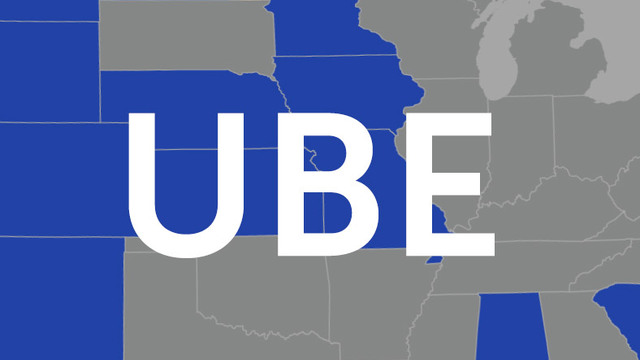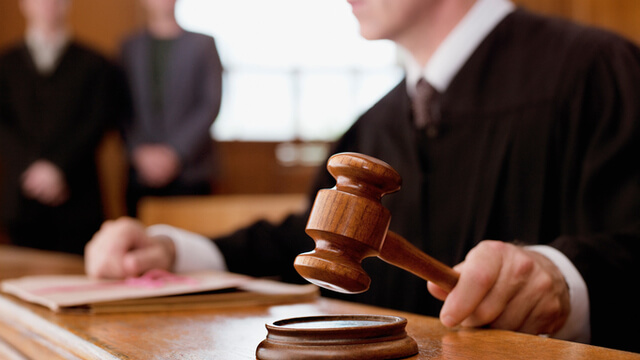The Uniform Bar Exam, or UBE, is 12 hours of testing, split over two days. It consists of three parts: Multistate Performance Test (MPT), Multistate Essay Exam (MEE), and the Multistate Bar Exam (MBE). Your jurisdiction may also have a state-specific component you must complete in addition to the UBE. If this is the case, the bar exam will be a bit longer for you.
You'll take the MPT and MEE on the first day, which is always a Tuesday. You'll take the MBE on the second day, which is always a Wednesday.
Multistate Performance Test Subjects
You'll have two assignments to complete, and 90 minutes for each assignment. Jurisdictions can choose one or both of the items to include on their bar exams. Jurisdictions that administer the UBE use both assignments.
This test looks at how someone would use fundamental lawyering skills in a realistic situation, and how they would complete the task. This is not a test of knowledge, but an evaluation of skill lawyers are expected to be able to demonstrate regardless of area of law they intend to practice.
The American Bar Association for Law Students suggests test takers spend the first 45 minutes reading the File and Library and split the remaining half of the time between the two questions based on how difficult they are. Try to have a bit of time left over to edit and review your response.
Multistate Essay Exam Subjects
You'll take this portion of the UBE after lunch. You'll be given three hours to answer six MEE essay questions. You can divide the time up however you need to, but keep in mind, you have 30 minutes per essay if you want to give them all equal attention.
Allow 10 to 15 minutes for reading the prompt and 15 to 20 minutes to write your response. Use any remaining time to review and edit your answer.
- Business Associations: Agency and partnership, and corporations and limited liability companies.
- Civil Procedure: Jurisdiction and venue, the law applied by federal courts, pretrial procedures, jury trials, motions, verdicts and judgements, and appealability and review.
- Conflicts of Law: These issues are embedded in other topic areas and do not appear as standalone questions. Issues include domicile, the jurisdiction of courts, choice of law, and recognition and enforcement of other states' judgments and foreign judgments.
- Constitutional Law: Nature of judicial review, separation of powers, relation of nation and states in a federal system, and individual rights.
- Contracts: Formation of contracts, defenses to enforceability, contract content and meaning, performance, breach and discharge, remedies, and third-party rights.
- Criminal Law and Procedure: Homicide, other crimes, inchoate crimes; parties, general principles, and constitutional protection of accused persons.
- Evidence: Presentation of evidence, relevancy and reasons for excluding relevant evidence, privileges and other policy exclusions, writings, recordings, and photographs, and hearsay and circumstances of its admissibility.
- Family Law: Getting married, being married, separation, divorce, dissolution, and annulment, child custody, rights of unmarried cohabitants, parent, child, and state, adoption, and alternatives to adoption.
- Real Property: Ownership of real property, rights in real property, real estate contracts, mortgages/security devices, and titles.
- Secured Transactions: Assume articles 1 and 9 of Uniform Commercial Code are adopted and in effect. General UCC principles, applicability, and definitions, validity of security agreements and rights of parties, rights of third parties, default.
- Torts: Intentional torts, negligence, strict liability and products liability, and other torts.
- Trusts and Decendents’ Estates: Intestate succession, wills, family protection, living wills and durable healthcare powers, and trusts and future interests.
The essay questions will likely cover more than one area of law and include information irrelevant to the case, as is expected in real-life situations. You should know how to analyze the fact pattern, find the issues and the relevant facts, and address the legal issues with the applicable black-letter law.
For the second day of testing, you'll have 200 multiple choice questions to answer. You'll have three hours to answer the first 100 in the morning, and another three hours to answer the remaining 100 questions after lunch. Subjects are evenly distributed throughout the questions, rather than having separate sections for each topic. Answer all the questions, even though only 175 of them will be scored.
- Civil Procedure
- Criminal Law and Procedure
- Torts: Assume that survival actions and claims for wrongful death are available.
- Real Property
- Contracts
- Constitutional Law
- Evidence: Answered according to the Federal Rules of Evidence.
The best way to prepare for this portion of the bar exam is practicing on real MBE questions. BarMax offers the largest and most affordable bank of real MBE questions on the market both as a stand-alone MBE supplement and as part of our comprehensive Uniform Bar Exam course.
Multistate Professional Responsibility Examination
Before you are admitted to the bar, you'll also have to pass the Multistate Professional Responsibility Examination (MPRE), which is administered separately. The MPRE consists of 60 multiple-choice questions, 50 of which are scored. Examinees will have two hours to answer all the questions.
The subject matter tested (and the approximate percentage of questions in each) on the MPRE is as follows:
- Regulation of the legal profession (6% to 12%)
- Client-lawyer relationship (10% to 16%)
- Conflicts of interest (12% to 18%)
- Client confidentiality (6% to 12%)
- Competence, legal malpractice, and civil liability (6% to 12%)
- Litigation and other forms of advocacy (10% to 16%)
- Communications and transactions with persons other clients (2% to 8%)
- Different roles as a lawyer (4% to 10%)
- Safekeeping funds and other property (2% to 8%)
- Communications about legal services (4% to 10%)
- Lawyers' duties to the public and legal system (2% to 4%)
- Judicial conduct (2% to 8%)
Passing MPRE scores are established by each jurisdiction. 75 is the lowest passing score (Alabama, DC, Georgia, Kentucky, Mississippi, New Jersey, Oklahoma, Pennsylvania, South Dakota, Tennessee, West Virginia and Wyoming) while 86 is the highest passing score (California). The most common passing score is 85.
BarMax offers a free, comprehensive course for the MPRE with on-demand audio lectures, black-letter law outlines, flashcards and sample MPRE questions.
You can also purchase MPRE Online Practice Exams for $24.99 each if you are looking for additional real MPRE questions. These are the same exams that the NCBE sells for $40 each.









